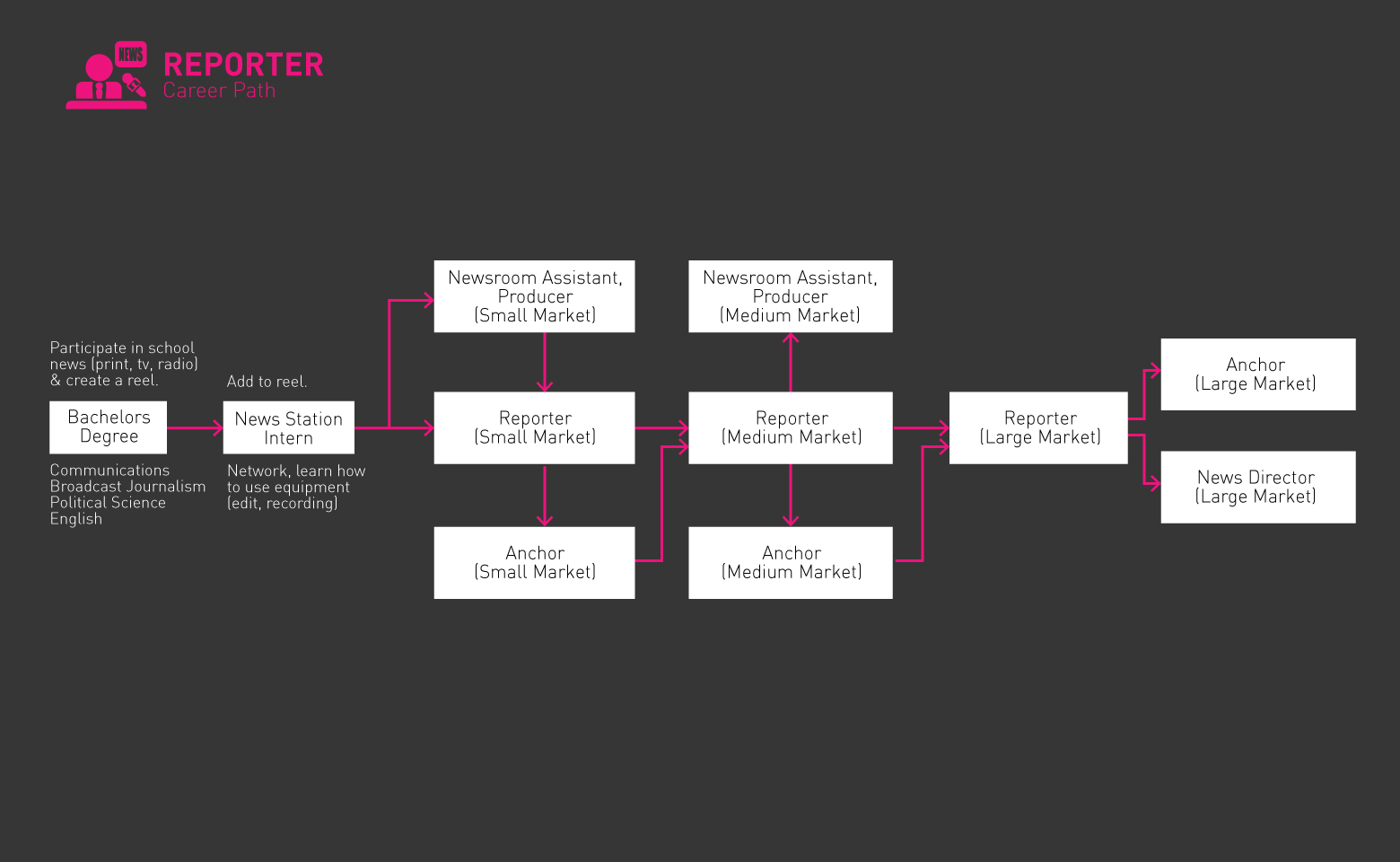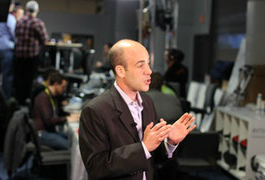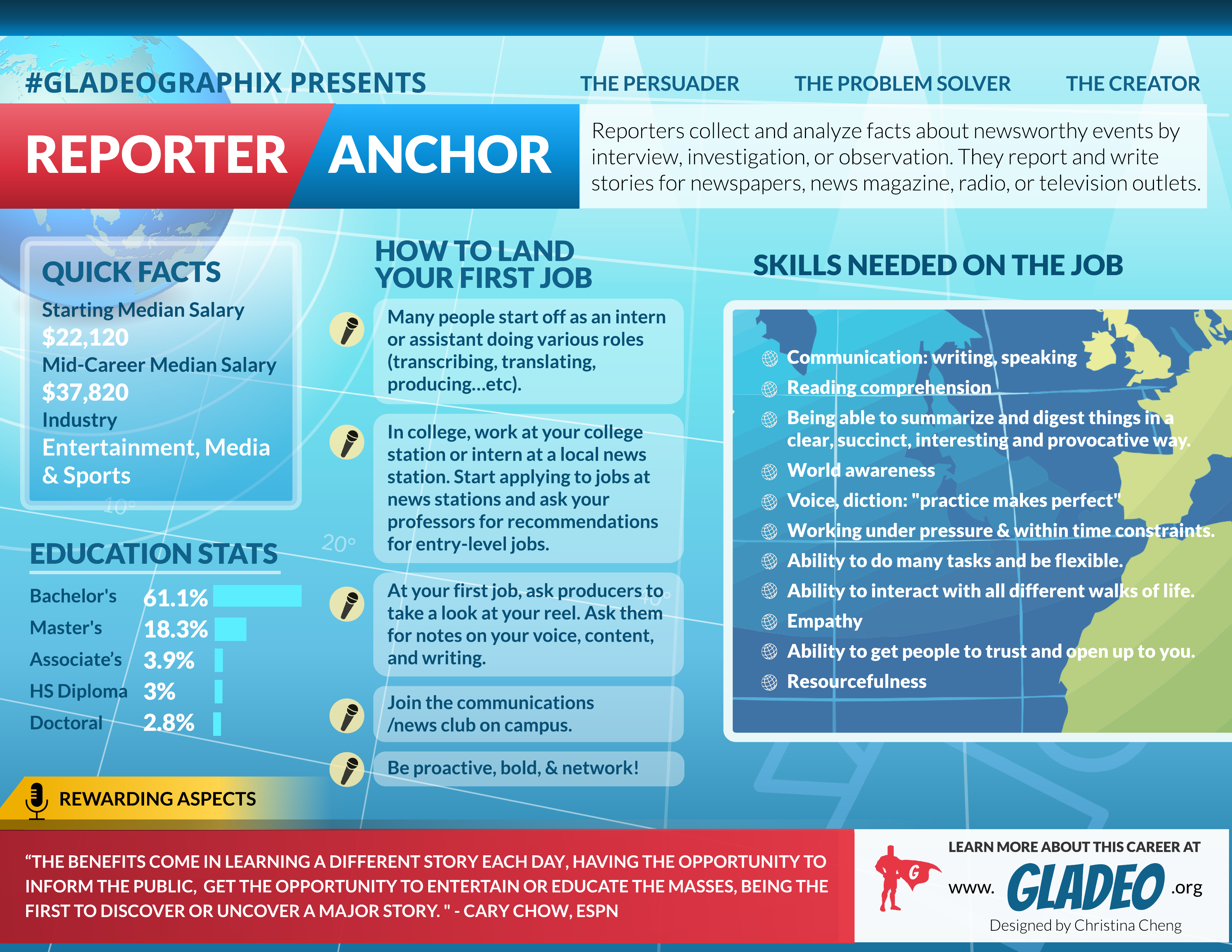Focos
Journalist, Correspondent, Anchor
Reporters collect and analyze facts about newsworthy events by interview, investigation, or observation. They reports and write stories for a newspaper, news magazine, radio, or television outlets.
- Diverse in what you get to see/learn and whom you meet.
- Experience things people can only dream of.
- No 2 days of work are exactly the same.
- You’re not sitting in a cubicle in front of a computer all day.
- Have a certain liberty to map out how you want your work to be perceived.
- Opportunity to help people: Media can do a lot of things to inform the public of injustice. You have the power to influence and impact.
“The benefits come in learning a different story each day, having the opportunity to inform the public, get the opportunity to entertain or educate the masses, being the first to discover or uncover a major story. It's a fantastic rush and when you hear from a complete stranger how a story you did made a difference in their life - there's hardly a better feeling in the world! It's also sweet when random people come up to you on the street and thank you for doing a good job.” – Cary Chow, ESPN
Daily Feature News
- Check the local wire service agenda (on the CNS wire, it's called the "Budget" and on the AP wire, the "Daybook") for any prearranged press conferences, protests…etc.
- Consult with the editor/producer to decide which stories to cover.
- Attend 3-4 different press conferences a day: ask questions, follow up one on one interviews and record sound bites.
- Write and record story and send to station, usually a fast turnaround time to be aired that day, even that hour.
Breaking News
- Includes shooting, earthquake, fire, prominent figure arrested…etc
- Track down people to interview who are related to the incident.
- Go live with news anchor or host of the show to talk about what’s happening and answer any questions.
Enterprise/Investigative Stories
- Find topic and find people willing to talk to you about the topic.
- Longer in length
- Usually takes multiple days
- Communication: writing, speaking
- Reading comprehension
- Being able to summarize and digest things in a clear, succinct, interesting and provocative way.
- World awareness
- Voice, diction: "practice makes perfect"
- Ability to work under pressure and within time constraints.
- Ability to do many tasks and be flexible.
- Ability to interact with all different walks of life.
- Empatía
- Ability to get people to trust and open up to you.
- Ingenio
- Little pay at the beginning so need to be willing to supplement your job with another flexible job.
- Willingness to live in whatever city to start and move around a lot.
- For instance, you will probably not be able to control in which city you begin your career. It is rare to start and end your career in the same city.
- Cutthroat: People are extremely competitive.
- Willingness to do menial tasks at the beginning of your career.
- Most likely you won’t have holidays off in the beginning of your career.
- Willingness to be on-call.
- Getting more consolidated, companies are buying other companies.
- Less high-paying anchor jobs.
- Less traditional media jobs; however, growth on the internet makes way for journalist/bloggers and many one-man operations.
- Pretended they were a reporter in front of their mirror.
- Being inquisitive: Asked lots of questions to people they meet.
- Cared about what’s going on around them (locally, internationally).
- Wanted to share what they find out to other people (via conversations, on their Twitter feed, Facebook timeline).
- Read blogs, online magazines, newspaper.
- Reporters generally hold a bachelor’s in communications, broadcast journalism, new media management, or something similar
- In addition to journalism, reporters often take courses to learn how to interview others, speak in front of a camera or on radio broadcasts, and report from hazardous situations or environments
- Many Reporters hone skills on the job as interns, journalists, or writers for school or local publications or local news TV and radio
- Those who specialize in a particular field, such as economics, politics, sports, or international affairs, usually require relevant education in that subject
- Common courses include English, writing, speaking, presentation, journalism, photojournalism, news writing and reporting, storytelling, laws of mass communication, ethics, and electronic media
- Active journalism program where you can learn with hands-on experience.
- Has a school news station or a close connection/interaction to the city’s local news station.
- Active alumni who will be willing to mentor you and potentially get you your first internship or job.
- Professors who have professional journalism experience.
- Good academic program.
- Some journalists major in Political Science, Government, Economics, Business and minor in journalism so that they can learn about how business and politics function which will help them become a better journalist and potentially specialize in the future (i.e. Political correspondent on CNN or Financial correspondent on MSNBC).
- Stock up on courses in English, writing, speaking, psychology, debate, journalism, storytelling, ethics, and electronic media
- Hone your research and fact-checking skills, and ask for feedback on your work to ensure objectivity and clarity. Be sure to edit your writing or scripts carefully
- Consider taking an improv acting class to learn about voice projection and poise under pressure
Try a vocal training course to help with inflection and enunciation - Watch and follow the news: Notice what stories you like, which ones grab your attention. Develop a sense for finding newsworthy stories often buried in other media noise
- Do it!: Start your own YouTube channel of you interviewing people and producing full length features of stories that interest you.
- Keep a journal of everything you have learned and experienced.
- Join debate teams to get practical experience with forming arguments and speaking persuasively: As a reporter, you have to be unbiased. Practice gathering evidence and facts from both sides so you can report without being biased.
- Work on your voice by listening to the best reporters on TV: Concentrate on projection, inflection and enunciation.
- Practice being detail-oriented.
- Figure out which medium you like the best: writing, speaking (are you okay in front of the camera?)
- Start a blog.
- Apply for roles at local or school newspapers, radio shows, podcasts, or TV stations
- Interview working Reporters to gain insights and career advice. See if one will let you shadow them!
- Pay attention to grammar and spelling when you write anything.
- Learn how to write for TV and radio.
- Create a resume reel.
- Feedback: Always ask for feedback on your voice and material.
- Decide which area you want to specialize in, so you can focus additional studies in that area
In addition to areas of specialization, figure out which of the multiple types of Reporters you want to be. For example: Assignment Reporter (aka Media Correspondent), Assignment Reporter, Beat Reporter, Columnist, Sports and Weather Reporter, Print Reporter and Television and Radio Reporter - Try to make as many industry contacts as you can through constant networking, so you have people you can call for tips and requests. Sign up for HARO (Help a Reporter Out) to gain access to experts, witnesses, and other sources of information
- Study books, articles, and video tutorials about Reporting
- Keep a detailed journal and list of contacts
- Build yourself an awesome resume reel to hook potential employers!
- 3% with HS Diploma
- 3.9% with Associate’s
- 61.1% with Bachelor's
- 18.3% with Master's
- 2.8% with Doctoral
*% of employees aged 25 to 44 in the occupation whose highest level of educational attainment is

- In college, work at your college station or intern at a local news station. With the reel of your internship work, start applying to jobs at news stations. Ask your professors for recommendations for entry-level jobs.
- Your first job is not necessarily going to be on the air. Many start off as an intern or assistant doing various roles (transcribing, translating, producing…etc).
- If doing an internship, let your supervisor know your end goal is to become a full-fledged Reporter and ask for their mentorship
- If attending a college program, ask your program manager or school career center for assistance with resumes, interviewing, and connecting with potential employers
- Let your network know you are looking for Reporter jobs or internships!
- Check out the websites of local news agencies or papers to hunt for overlooked opportunities
- At your first job, ask producers to take a look at your reel. Ask them for notes on your voice, content, and writing.
- Join the communications/news club on campus.
- Be proactive.
- Be bold.
- Dress professionally for job interviews!
The majority of people climb the market chain. There are 210 total TV markets in the country - #1 (largest) - NYC, #2 - LA. The smallest is somewhere in Montana. It doesn't really matter where you start - if your work is good, you can succeed. Click here for the list of markets.
- Endurance, flexibility, willing to put up with "not-so-great" assignments and giving 100% to each story.
- Detail-oriented: don’t miss things when you are sent to cover, do your homework!
- Ethics: don’t steal/use other people’s ideas.
- Curiosity: always open to learning new things, stay up to date with technology.
- Television: looks (stay in shape)
- Develop a competitive advantage “feature”: multi-lingual (Spanish, Chinese..etc), diversify your skill set (internet, entertainment…etc.), build your brand (i.e. the sustainability reporter).
- Persistencia
- Perseverance
- Pro-activeness
- Slight ego
“In the first markets, you have to try to make yourself better -- that means taking more risks and failing more often. But the key to success is repetition. In WY, I was hired as weekend anchor, weekday reporter. Most of that reporting entailed shooting and editing my own video. Within the first year, I would end up producing, becoming their main anchor, doing sports, training for weather, and running my own franchise piece.” – Cary Chow, ESPN
Trade Sites and Associations
- National Association of Broadcasters
- Sociedad de Periodistas Profesionales
- Radio Television News Director Association
- Associated Press Television and Radio Association
- Fantastic training program called APTRA Academy
- Media Bistro
- Talkers
- All Access Music Group
- National Association of Black Journalists, National Association of Hispanic Journalists, Native American Journalist Association, and Asian American Journalist Association
- Dow Jones News Fund
- Online News Association
Libros
- Writing News: “Writing Broadcast News: Shorter Sharper Stronger.” By Mervin Block
- Networking Skills: “How to Win Friends and Influence People” by Dale Carnegie, “Never Eat Alone” by Tahl Raz
- Dynamics of News Reporting and Writing; Journalism in the Digital-First Age, by Vincent F. Filak
- Sound Reporting: The NPR Guide to Audio Journalism and Production, by Jonathan Kern
- Writing and Reporting News: A Coaching Method, by Carole Rich
Key transferable skills: writing for press, public speaking, interviewing skills, sound editing
Alternate Careers: Public relations manager, Corporate communications manager, Various jobs in factual entertainment, publicist.
- Intern or join one or more of the associations for networking and mentorship.
- Get another degree for backup or to help supplement your income. (i.e. double major)
- It’s a marathon. Nothing comes overnight.
- Be willing to risks: Might have to leave a steady salary for a riskier job that is more challenging.
- Be willing to take advice and criticism.
- Be patient.
- Be confident.
Noticias

Ofertas de empleo

Cursos y herramientas en línea









